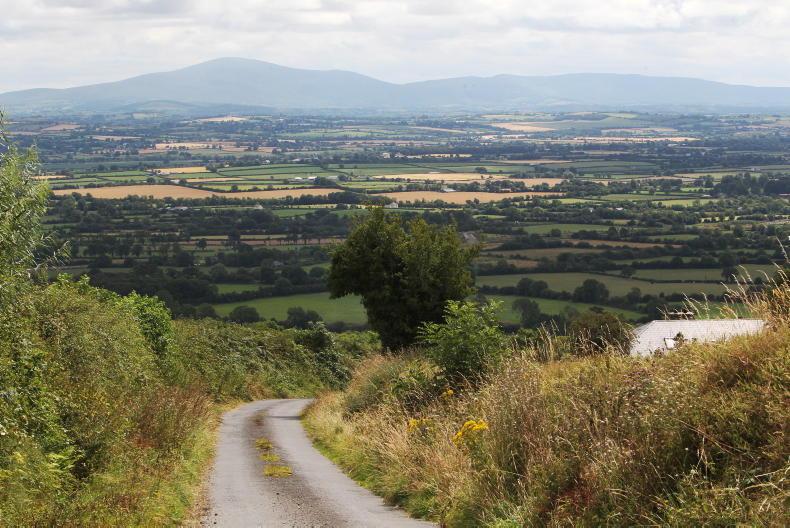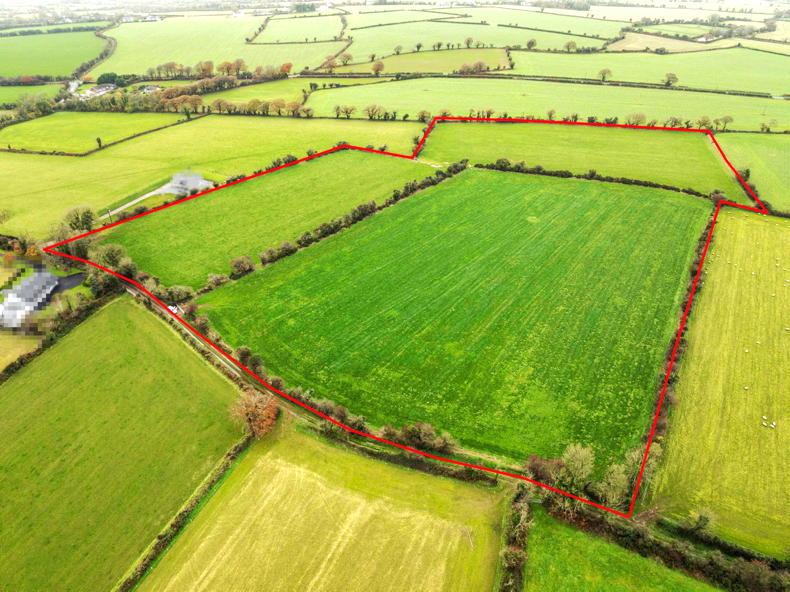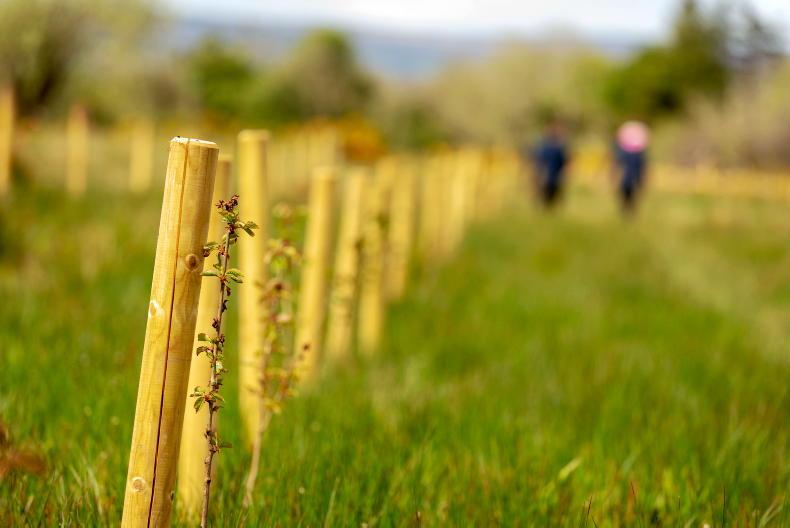Every four years of my life, the Olympics has come along.
I was born two years after the first Tokyo Olympics, so my first memories are of Munich in 1972, of Lasse Viren, Olga Korbut and Kip Keino.
Seeing the five-ringed circus returning a year late is a mark of time. Munich is almost 50 years ago - where does the time go?
I had a similar feeling on Tuesday night, when I tuned into a meeting on rights of way.
Hosted by south Leinster IFA, 270 people tuned in. As James Staines, the IFA's legal adviser, ran through the chronology of the act, I could only ask where the time has gone.
Pressing issue - in 2005
When I joined the IFA's farm business committee in 2005, rights of say was a pressing issue being discussed.
Legislation was being prepared that would change the governance around these ancient rights.
I'm no historian, but I'm sure such rights have been in existence across Brehon common law, British law and, for the last century, Irish law.
The law that concerns people at present is the Registration of Prescriptive Easements 2009 Act. The legislation, as you would have gathered, passed through the Oireachtas 12 years ago now.
It was originally due to be applied in 2012, but there were concerns from all sides that the timelines were too tight. Thus, a nine-year extension was agreed.
Extension
That's two Olympic Games cycles, even allowing for a postponement forced by a pandemic.
The extension has been in place since London 2012, with Jessica Ennis, Katie Taylor and Mo Farah.
Mo can no longer qualify for an Olympics and now time is finally catching up with this period of grace.
The extension ends this year. The current old law will be superseded by the 2009 Act from 30 November on. Where has the time gone?
Glass half full
So having sat on the committee that discussed this more than 15 years ago and having reported on the new law being passed in 2009 and the nine-year extension being subsequently granted, you'd think I would have resolved any issues that present here at home, wouldn't you?
The estimate is that less than half of the existing rights of way are formally registered
Well, I haven't. And it seems I'm in a majority.
The estimate is that less than half of the existing rights of way are formally registered.
And with time running out, people who haven't started their applications will be in a race against time to beat the deadline.
The process can be arduous. One person on the meeting last Tuesday recounted having their application in train since 2012, but it not being complete yet.
That would have terrified many of those on the Teams meeting, myself included.
Reassured
And yet, we were reassured by the always calm James Staines that, for most people, their circumstances will not be changed by the change in law.

James Staines.
The main difference, it seems, is that for a right of way to be recognised from 1 December on, it will have to have been maintained for 12 years continuously prior to application.
From John Treacy and Carl Lewis to Michelle Smith and Michael Johnson, from Ghostbusters and Purple Rain to Independence Day and Trainspotting
Any break in that 12-year cycle will be a problem. That's four Olympics, from Los Angeles 1984 through Seoul and Barcelona to Atlanta 1996.
That's from John Treacy and Carl Lewis to Michelle Smith and Michael Johnson, from Ghostbusters and Purple Rain to Independence Day and Trainspotting. Without a break.
It seems it doesn't matter if there was an unbroken right of way back to Cuchulainn if the 12-year yardstick hasn't been adhered to. So that is a problem.
Another problem is if one landowner through whose land a right of way is being established is not regarded as legally competent to sign approval or agreement to that right of way.
Another extension
Is there anything to be said for another extension?
IFA farm business chair Rose Mary McDonagh told the meeting that the IFA has requested that a further extension to the new Act be applied.

IFA president Tim Cullinan with IFA farm business chair Rose Mary McDonagh.
James Staines added that the Law Society has recently requested a six-year extension. Presumably, it believes that is how long it will take to register the bulk of the rights of ways that are in daily usage across the fields, bohreens, yards and laneways of our little country.
McDonagh said that for the vast majority of landowners there will be no difference from 1 December 2021, but for a small cohort that will be impacted "it will be a big challenge".
Staines added that one in three calls to the legal helpline established by the IFA concerns rights of way.
It seems the paperwork is complex
Everybody on the call, including the two representatives from the Property Registration Authority of Ireland, Isobel Lyons and Anne Marie Carr, acknowledged that COVID has played havoc with the ability to make progress.
Meeting solicitors, people working from home rather than offices, not being able to call round to a neighbour to discuss an application or get a form signed, all these things add up.
And it seems the paperwork is complex. The PRAI website has a checklist of what is needed and informs that 70% of applications are rejected due to incomplete paperwork.
The IFA has quarterly meetings with the PRAI through a customer focus group they are a part of. I would imagine the next meeting will be rather fraught as the deadline approaches and the pressure mounts.
Love thy neighbour as thyself
What was crystal clear from the meeting is that there is a fast-track method of establishing a right of the successful completion of Land Registry Form 68 by all parties, both the person seeking to establish a right of way and the landowners through whose property the right of way proceeds.
Of course, if the other parties refuse to sign this form, as they are perfectly entitled to do, form 68 is of no use. Form 69, a self-declaration of the right of way, is now required.
Should this be unopposed, a right of way is on the way, but if it is successfully opposed by a notice party, there may be a need to head to court. This is when the process gets pretty expensive.
Entitlement
So why would a landowner refuse to sign a form 68? As many reasons as there are lakes in Leitrim.
Some people are afraid that they are signing away entitlements of their own. Some may have fallen out with the other party. This can happen with families.
Sometimes it may be fear that an agricultural right of way up a lane or though a yard could evolve into a right of way for a house or houses. It could even be the Nick Cave line - some people just ain't no good.
Over the next four months, or the next six years if the Law Society gets its extension to the extension, thousands of landowners and lane-owners and lane-sharers will be visited by neighbours requesting that they sign a form 68 and help them to register a right of way.
Consultation
James Staines suggested that perhaps an offer to pay for a legal consult to reassure the prospective signee that their rights would be in no way impaired would work. It is an intelligent suggestion.
A cyncial mind might think that Mr Staines was ensuring a lot of legal consults and a handy earner for solicitors.
Anticipating the possible presence of cynics (I confess I was a little ashamed), he pointed to the minuscule cost of such an action compared with the cost of going to court to establish the right of way.
He also said that most solicitors dread rights of way disputes.
So, if you are approached to sign, perhaps have that consult, satisfy yourself that you will not be disadvantaged and sign the form. Treat your neighbour, as the good book says, the way you would want your neighbour to treat you.
Because every laneway has another turn, no matter who owns it.
They say good fences make good neighbours. Good relations do too. Hopefully, by the time the 2028 Olympics come round, (back in LA!), most farmers will have established their rights of way and the 2009 Act, by then legally old enough to buy a drink or get married, will have it's graduation into law.
Every four years of my life, the Olympics has come along.
I was born two years after the first Tokyo Olympics, so my first memories are of Munich in 1972, of Lasse Viren, Olga Korbut and Kip Keino.
Seeing the five-ringed circus returning a year late is a mark of time. Munich is almost 50 years ago - where does the time go?
I had a similar feeling on Tuesday night, when I tuned into a meeting on rights of way.
Hosted by south Leinster IFA, 270 people tuned in. As James Staines, the IFA's legal adviser, ran through the chronology of the act, I could only ask where the time has gone.
Pressing issue - in 2005
When I joined the IFA's farm business committee in 2005, rights of say was a pressing issue being discussed.
Legislation was being prepared that would change the governance around these ancient rights.
I'm no historian, but I'm sure such rights have been in existence across Brehon common law, British law and, for the last century, Irish law.
The law that concerns people at present is the Registration of Prescriptive Easements 2009 Act. The legislation, as you would have gathered, passed through the Oireachtas 12 years ago now.
It was originally due to be applied in 2012, but there were concerns from all sides that the timelines were too tight. Thus, a nine-year extension was agreed.
Extension
That's two Olympic Games cycles, even allowing for a postponement forced by a pandemic.
The extension has been in place since London 2012, with Jessica Ennis, Katie Taylor and Mo Farah.
Mo can no longer qualify for an Olympics and now time is finally catching up with this period of grace.
The extension ends this year. The current old law will be superseded by the 2009 Act from 30 November on. Where has the time gone?
Glass half full
So having sat on the committee that discussed this more than 15 years ago and having reported on the new law being passed in 2009 and the nine-year extension being subsequently granted, you'd think I would have resolved any issues that present here at home, wouldn't you?
The estimate is that less than half of the existing rights of way are formally registered
Well, I haven't. And it seems I'm in a majority.
The estimate is that less than half of the existing rights of way are formally registered.
And with time running out, people who haven't started their applications will be in a race against time to beat the deadline.
The process can be arduous. One person on the meeting last Tuesday recounted having their application in train since 2012, but it not being complete yet.
That would have terrified many of those on the Teams meeting, myself included.
Reassured
And yet, we were reassured by the always calm James Staines that, for most people, their circumstances will not be changed by the change in law.

James Staines.
The main difference, it seems, is that for a right of way to be recognised from 1 December on, it will have to have been maintained for 12 years continuously prior to application.
From John Treacy and Carl Lewis to Michelle Smith and Michael Johnson, from Ghostbusters and Purple Rain to Independence Day and Trainspotting
Any break in that 12-year cycle will be a problem. That's four Olympics, from Los Angeles 1984 through Seoul and Barcelona to Atlanta 1996.
That's from John Treacy and Carl Lewis to Michelle Smith and Michael Johnson, from Ghostbusters and Purple Rain to Independence Day and Trainspotting. Without a break.
It seems it doesn't matter if there was an unbroken right of way back to Cuchulainn if the 12-year yardstick hasn't been adhered to. So that is a problem.
Another problem is if one landowner through whose land a right of way is being established is not regarded as legally competent to sign approval or agreement to that right of way.
Another extension
Is there anything to be said for another extension?
IFA farm business chair Rose Mary McDonagh told the meeting that the IFA has requested that a further extension to the new Act be applied.

IFA president Tim Cullinan with IFA farm business chair Rose Mary McDonagh.
James Staines added that the Law Society has recently requested a six-year extension. Presumably, it believes that is how long it will take to register the bulk of the rights of ways that are in daily usage across the fields, bohreens, yards and laneways of our little country.
McDonagh said that for the vast majority of landowners there will be no difference from 1 December 2021, but for a small cohort that will be impacted "it will be a big challenge".
Staines added that one in three calls to the legal helpline established by the IFA concerns rights of way.
It seems the paperwork is complex
Everybody on the call, including the two representatives from the Property Registration Authority of Ireland, Isobel Lyons and Anne Marie Carr, acknowledged that COVID has played havoc with the ability to make progress.
Meeting solicitors, people working from home rather than offices, not being able to call round to a neighbour to discuss an application or get a form signed, all these things add up.
And it seems the paperwork is complex. The PRAI website has a checklist of what is needed and informs that 70% of applications are rejected due to incomplete paperwork.
The IFA has quarterly meetings with the PRAI through a customer focus group they are a part of. I would imagine the next meeting will be rather fraught as the deadline approaches and the pressure mounts.
Love thy neighbour as thyself
What was crystal clear from the meeting is that there is a fast-track method of establishing a right of the successful completion of Land Registry Form 68 by all parties, both the person seeking to establish a right of way and the landowners through whose property the right of way proceeds.
Of course, if the other parties refuse to sign this form, as they are perfectly entitled to do, form 68 is of no use. Form 69, a self-declaration of the right of way, is now required.
Should this be unopposed, a right of way is on the way, but if it is successfully opposed by a notice party, there may be a need to head to court. This is when the process gets pretty expensive.
Entitlement
So why would a landowner refuse to sign a form 68? As many reasons as there are lakes in Leitrim.
Some people are afraid that they are signing away entitlements of their own. Some may have fallen out with the other party. This can happen with families.
Sometimes it may be fear that an agricultural right of way up a lane or though a yard could evolve into a right of way for a house or houses. It could even be the Nick Cave line - some people just ain't no good.
Over the next four months, or the next six years if the Law Society gets its extension to the extension, thousands of landowners and lane-owners and lane-sharers will be visited by neighbours requesting that they sign a form 68 and help them to register a right of way.
Consultation
James Staines suggested that perhaps an offer to pay for a legal consult to reassure the prospective signee that their rights would be in no way impaired would work. It is an intelligent suggestion.
A cyncial mind might think that Mr Staines was ensuring a lot of legal consults and a handy earner for solicitors.
Anticipating the possible presence of cynics (I confess I was a little ashamed), he pointed to the minuscule cost of such an action compared with the cost of going to court to establish the right of way.
He also said that most solicitors dread rights of way disputes.
So, if you are approached to sign, perhaps have that consult, satisfy yourself that you will not be disadvantaged and sign the form. Treat your neighbour, as the good book says, the way you would want your neighbour to treat you.
Because every laneway has another turn, no matter who owns it.
They say good fences make good neighbours. Good relations do too. Hopefully, by the time the 2028 Olympics come round, (back in LA!), most farmers will have established their rights of way and the 2009 Act, by then legally old enough to buy a drink or get married, will have it's graduation into law.












SHARING OPTIONS